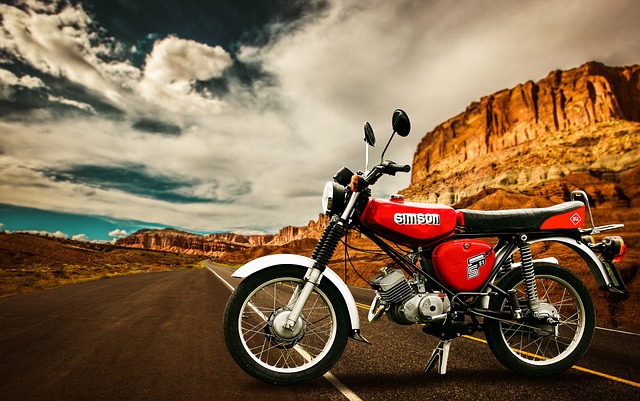Buying mopeds for sale involves considering engine type, top speed, fuel efficiency, comfort, and safety features. Local laws govern moped use, requiring specific licenses, registration, insurance, and sometimes age restrictions or safety gear. When compared to motorcycles, mopeds generally require only a standard driver's license due to their lower maximum speeds. Age restrictions and eligibility criteria vary by region, with minimum requirements often ranging from 14 to 16 years old. License types and validity periods are crucial; common classes include Class M (moped) and Class O (operator's license). Insurance and registration are key legal steps, with processes varying by location but usually requiring proof of coverage and vehicle inspection. Understanding local regulations and a moped's compliance is essential to avoid mistakes and ensure safe operation on public roads.
Thinking about buying a moped? This guide breaks down the simple licensing requirements for mopeds vs. motorcycles, covering everything from age restrictions and license types to testing, insurance, and common pitfalls. Whether you’re a first-time buyer or looking to refresh your knowledge, understanding these steps is key when navigating the process of purchasing mopeds for sale.
Understanding Mopeds for Sale: A Quick Overview

When considering mopeds for sale, understanding the basic definition and features is a smart starting point. Mopeds, also known as motorbikes or scooters, are two-wheeled vehicles typically powered by a small engine, usually under 50cc. They are designed for urban commuting and leisure riding, offering agility and maneuverability on narrow streets. These compact machines come in various styles, from classic retro designs to modern electric models, catering to diverse consumer preferences.
For buyers, evaluating factors like engine type (petrol or electric), top speed, fuel efficiency, and comfort is essential. Additionally, considering safety features such as brakes, lighting, and reflective elements becomes crucial. Since mopeds for sale often fall under lighter vehicle categories, they may have different licensing requirements compared to larger motorcycles, making it a vital aspect for prospective owners to research and understand before taking the road.
Legal Requirements for Moped Ownership: An Overview

Before purchasing mopeds for sale, understanding the legal requirements for ownership is crucial. Each jurisdiction has its own set of regulations governing the use of mopeds on public roads, and adhering to these laws is essential for safety and legality. Generally, owning a moped involves securing a driver’s license, registering your vehicle, and obtaining insurance. Some regions may also mandate certain safety equipment, like helmets, and impose restrictions based on age or engine displacement.
Additionally, there could be local by-laws that dictate where and how mopeds can be operated. This might include rules about parking, lighting requirements, and even specific routes designated for low-speed vehicles. Staying informed about these legal nuances ensures not only compliance but also a smoother experience as a moped owner in your area.
Licensing Needs for Mopeds vs. Motorcycles

When considering mopeds for sale versus motorcycles, licensing requirements can vary significantly. Mopeds are typically defined as low-powered vehicles designed for urban commuting and often have a maximum speed of 30 mph (48 km/h) or less. Due to their smaller size and lower performance, mopeds usually require less stringent licensing regulations. In many jurisdictions, a standard driver’s license is sufficient to operate a moped, with no additional specialized endorsements needed.
In contrast, motorcycles are classified as more powerful and speedier vehicles, often capable of reaching higher velocities and offering more advanced handling dynamics. As such, licensing for motorcycles typically involves stricter criteria, including the possibility of requiring a special endorsement or additional training to ensure safe operation. Riders of motorcycles may need to pass more rigorous tests compared to moped drivers, reflecting the enhanced skill set required for managing a more powerful machine.
Age Restrictions and Eligibility Criteria

When considering mopeds for sale, age restrictions and eligibility criteria play a significant role in ensuring safe usage. In many jurisdictions, there are minimum age requirements for purchasing and operating mopeds, typically ranging from 14 to 16 years old. These laws are put in place to protect younger individuals, as they may lack the necessary maturity and skill to handle these two-wheeled vehicles responsibly.
In addition to age limits, eligibility often involves a combination of factors such as successful completion of a moped safety course and holding a valid driver’s license (if required by local regulations). These requirements aim to foster responsible riding habits and minimize risks associated with inexperienced operators on mopeds.
Types of Licenses and Their Validity Periods

When considering buying mopeds for sale, understanding the types of licenses and their validity periods is key. The most common license types include Class M (moped) and Class O (operator’s license), with requirements varying by region. Typically, a valid driver’s license from another state or province may suffice for temporary operation, but local regulations should be checked to ensure compliance.
Moped licenses often have shorter validity periods compared to traditional driver’s licenses, ranging from 12 to 24 months, depending on the jurisdiction. Renewal processes usually involve passing a basic knowledge test, ensuring your vehicle meets safety standards, and possibly providing proof of insurance. Keeping track of these dates is crucial to avoid penalties or legal issues while enjoying your moped responsibly.
Testing and Certification Processes

When considering mopeds for sale, understanding the testing and certification processes is a key aspect of ensuring compliance with simple licensing requirements. These processes are designed to guarantee that vehicles meet safety standards and emission regulations before they can be introduced onto public roads. Typically, this involves rigorous examinations conducted by authorized bodies to assess various components such as brakes, lights, engines, and exhaust systems.
During testing, mopeds undergo a series of simulations and real-world scenarios to verify their performance and reliability. Once a moped passes these tests, it receives the necessary certifications, allowing it to be legally operated on roads. These certifications not only ensure the safety of riders but also contribute to maintaining order in the market by distinguishing legitimate mopeds from those that do not meet the required standards.
Insurance and Registration Procedures

When considering mopeds for sale, it’s crucial to remember that insurance and registration procedures are vital steps in ensuring a legal and safe purchase. These processes vary depending on your location but generally involve securing the appropriate coverage to protect against accidents or theft, as well as registering your moped with the relevant authorities.
Researching specific requirements in your area is essential. You’ll likely need to obtain a license plate, proof of insurance, and potentially additional documentation like a vehicle inspection certificate. These documents serve as your legal permission to operate the moped on public roads and are often required for registration renewal.
Common Pitfalls to Avoid During Licensing

When navigating the licensing process for mopeds for sale, there are several common pitfalls to avoid. One of the most frequent mistakes is not understanding the specific requirements and regulations in your area. Each region has its own set of rules regarding moped registration, insurance, and safety equipment, so it’s crucial to research these before you begin.
Another pitfall is assuming that all mopeds are created equal. Different types of mopeds have varying engine sizes, speeds, and features, which can affect the licensing process. Always verify that your moped meets the minimum requirements for legal operation, including age restrictions and knowledge tests. Ignoring these details can lead to delays or even legal consequences, so ensure you’re fully aware of what’s needed before riding onto the road.
